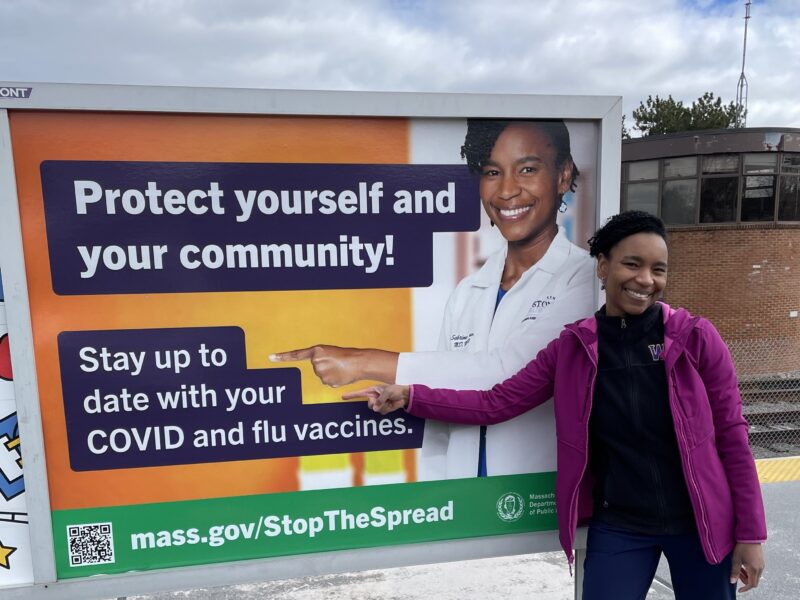Off-hours with Sabrina A. Assoumou, an Infectious Diseases Clinician-investigator and Boston Runner

In recent years, CHERISH Research Affiliate Sabrina A. Assoumou has become a familiar face in Boston and a trusted voice in the scientific community.
An infectious diseases physician and clinician-investigator at the Boston University Chobanian & Avedisian School of Medicine and the Center for Infectious Diseases at Boston Medical Center, Assoumou appeared in local and national news to provide guidance on COVID-19 and flu vaccinations and report on racial and health disparities affecting Black communities. She is also now a 2024-2026 New Voices member at the Academies of Sciences, Engineering, and Medicine, where she convenes with interdisciplinary leaders across the nation to address emerging STEM challenges.
Assoumou is also a close collaborator with CHERISH colleagues in Boston, including CHERISH Population Data & Modeling Core Co-director Benjamin Linas, and CHERISH investigators Jake R. Morgan and Alexander Walley. Their published studies demonstrated the cost-effectiveness of providing routine hepatitis C screening in primary care settings, identified patterns of discontinuation for medications for opioid use disorder, and presented opportunities and challenges of receiving HIV and HCV testing results at detoxification centers.
This month at the College for Problems on Drug Dependence (CPDD) 86th Annual Scientific Meeting in Montreal, Assoumou will be co-chairing an oral session on “Investigating and Tackling the HIV/AIDS and Drug Use Syndemic” in which she will present research showing how “Community-Based HIV Self-Testing among Persons Who Use Drugs Can Reach Ending the HIV Epidemic Goals.” There will also be research featuring Assoumou and CHERISH colleagues, including an accepted poster that will share preliminary findings on the health and economic outcomes of expanding shelter-based treatment with medications for opioid use disorder (MOUD).
In this inaugural Off-hours interview highlighting CHERISH Research Affiliates, Assoumou tells me about her experience as a 2024-2026 New Voices, her latest research projects, and how she finds balance through running.
Q: Congratulations, again on joining the 2024-2026 New Voices cohort! As you meet experts across the country, what insights or advice do you have on building connections and collaborations on a national level?
I was thrilled to have been selected as a member of the 2024-2026 New Voices program from the National Academies. It has been a true honor to join other emerging leaders from around the country to address pressing national issues.
So far, my general approach has been to join the conversation with an open mind and to connect with individuals outside of my field. For example, we have been working on projects to address issues such as the climate crisis and I have learned a lot from engineers and other scientists who come from disciplines that are different from medicine. I have been impressed by fresh perspectives from colleagues who have encouraged me to think outside the box. It has been such a fascinating experience.

Q: Last fall, you were awarded an R01 grant to investigate the effectiveness of evidence-based interventions to increase HIV PrEP uptake and treat opioid use disorder. What implications are on the horizon if the intervention achieves its objectives?
At the current time, HIV pre-exposure prophylaxis (PrEP) and MOUD are available, but their uptake has been suboptimal in certain groups such as persons who inject drugs. Our goal is to contribute toward current efforts to increase the uptake of PrEP and MOUD among individuals who would benefit from them.
In this R01 study that I am leading, we will test the efficacy of the CHORUS+ intervention which stands for Comprehensive HIV and Opioid use disorder Response to the Unaddressed Syndemic. The main objective of the study is to use a randomized controlled trial to determine the efficacy of the CHORUS+ intervention which provides access to HIV self-testing, PrEP, and MOUD initiation along with 6 months of peer recovery coaching to increase adherence.
The intervention aims to concurrently address HIV and opioid use disorder in response to the ‘Diagnose’ and ‘Prevent’ pillars of Ending the HIV Epidemic in the U.S. If successful, we are hoping to provide additional tools in the menu of options that are available to address HIV and opioid use disorder.
Q: Knowing that you are juggling multiple tasks as an investigator and attending physician, can you tell us about how you find time to reset?
Running is my primary self-care activity as I strive to reach some work-life integration. Over the past few years, I mapped out a 5-mile running loop that I try to do regularly. Running has become my “me” time when I am able to stop what I am doing and focus on the world around me. I run outside throughout the year and it is so great to see the seasons change. It is always fascinating to go from colorful flowers in the spring and summer, to vibrant foliage in the fall and snowy paths during winter.